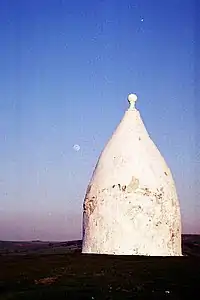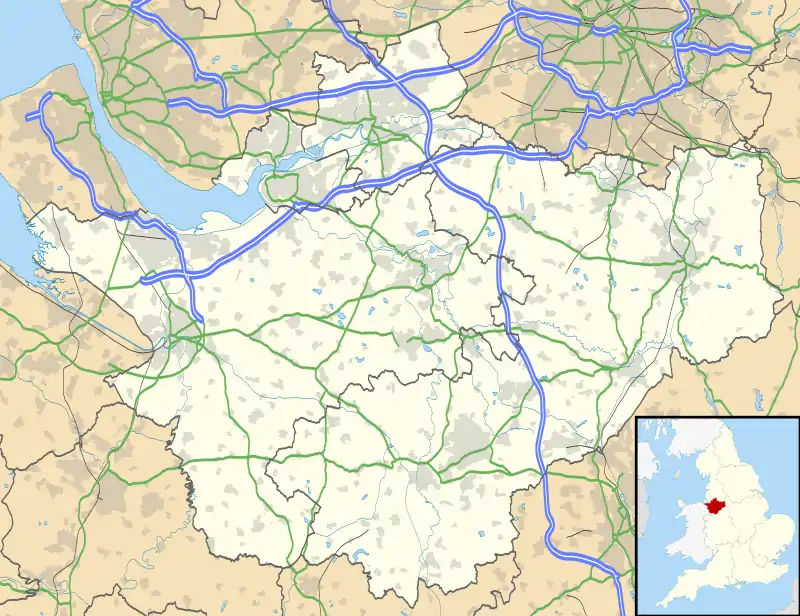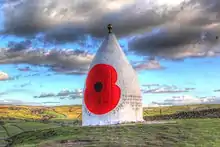White Nancy
White Nancy is a structure at the top of the northern extremity of Kerridge Hill, predominantly in the Parish of Rainow, overlooking the village of Kerridge and the town of Bollington, Cheshire, England. Since 1966 it has been recorded in the National Heritage List for England as a designated Grade II listed building.[1] Its profile forms the logo for the town of Bollington.[2][3] As to the origin of the name White Nancy, there are several theories: it may have been named after one of the Gaskell daughters, Nancy, or maybe after the horse that is said to have hauled the table top up the hill. However, much the most likely origin is that the hill once had upon it an Ordnance marker, as installed by mapping surveyors. Early maps noted the location as Northern Nancy.[4]
| White Nancy | |
|---|---|
 White Nancy in 2005 | |
| Location | Kerridge, Bollington, Cheshire, England |
| Coordinates | 53.29096°N 2.09235°W |
| OS grid reference | SJ 939 771 |
| Elevation | 280.5 metres (920 ft) |
| Built | 1815 |
| Built for | Gaskell family |
Listed Building – Grade II | |
| Official name | White Nancy |
| Designated | 17 March 1966 |
| Reference no. | 1138973 |
 Location in Cheshire | |
History
White Nancy was built in 1817 by John Gaskell junior of North End Farm to commemorate the victory at the Battle of Waterloo.[5] John Gaskell was a member of the Gaskell family who lived nearby at Ingersley Hall.[4] It originally had an entrance to a single room which was furnished with stone benches and a central round stone table, but the entrance is now blocked. It has been described as a summer house or a folly.[5] Locals supposedly told 1940s Army signallers working on Kerridge Hill that the landmark was named after the lead horse that had transported all materials for the building of White Nancy.[6]
Description
The structure is circular in plan with its shape described as that of a sugar loaf, and is surmounted with a ball finial. It is built in sandstone rubble which has been rendered and painted.[5] It is about 18 feet (5 m) high. Stone paving has been laid around its base which is inscribed with the points of the compass.[4]
Painting
Until at least 1925 the structure was unpainted.[7] It has been painted in a number of different colours over the years, most commonly in white.[4] In 2005 vandals painted it partly in pink.[8] In March 2009 it was repainted in white with the ball finial in black.[4] In 2012 a Jubilee crown and the dates 1952–2012 were added to the north-west face and Olympic rings added to the south-east face. The green ring is in the form of a laurel wreath encircling a gold medal and the number 29 which was added later to mark Team GB's 29 gold medals. It has also been painted with a large red remembrance poppy[9] and during the 1980s it was commonly painted at Christmas, decorated as a Christmas pudding or Father Christmas.
In 2015, in recognition of the reason for its construction, the structure was painted with a '200th Anniversary of the Battle of Waterloo' motif, and the silhouettes of soldiers in traditional military uniform from the time.[10] In May 2016 it was returned to its traditional all white with a black finial.
In May 2017, by request of the mayor of Bollington, a bee symbol was painted onto the monument to express solidarity with the people of Manchester after the Manchester Arena bombing.[11]
In March 2018 the face of Mark E. Smith of post-punk band the Fall was painted on White Nancy, together with the text “This Nation’s Saving Grace”. A Facebook group claimed responsibility.[12]
Visitor attraction

White Nancy provides a focus on the ridge of Kerridge Hill and from it there are extensive views across the Cheshire Plain towards the mountains of North Wales to the west, the hills of Shropshire to the south and the Pennines to the north and east. White Nancy and the Kerridge ridge are part of the Gritstone Trail.[13] The Peak District Boundary Walk also runs past the monument.[14]
White Nancy has been acclaimed and has featured in countdowns of the best British follies identified by The Telegraph[15][16] and by Alan Titchmarsh.[17]
See also
References
- Historic England, "White Nancy (1138973)", National Heritage List for England, retrieved 15 June 2014
- "Council Grants". Bollington Town Council. Retrieved 7 February 2018. Logo is prominent on page.
- "Bollington: Guide to Organisations" (PDF). Bollington Town Council. Retrieved 7 February 2018.
This monument can be seen from virtually anywhere in Bollington, and has become a much-loved symbol of the town.
- Boddington, Tim, "White Nancy", Happy Valley, retrieved 7 February 2018
- Pastscape: White Nancy, Historic England, retrieved 10 September 2009
- Oral history, serving soldier 1947–49
- White Nancy, The Kerridge Ridge and Ingersley Vale Countryside and Heritage Project, retrieved 10 September 2009
- Hird, Gavin (7 September 2005), "Nancy's in the pink!", Macclesfield Express, M.E.N. Media, retrieved 10 September 2009
- "Pictures: Silent tribute as Macclesfield marks Remembrance Sunday", Macclesfield Express, 15 November 2011, retrieved 8 November 2014
- Britton, Karen (7 May 2015), "Landmark gets latest makeover to mark 200th anniversary of Battle of Waterloo", Macclesfield Express, retrieved 1 June 2017
- Greer, Stuart (29 May 2017), "Macclesfield stands in solidarity with Manchester in wake of horrific attack", Macclesfield Express, retrieved 1 June 2017
- Smithers, Dominic (7 March 2018), "An image of Mark E Smith has been painted on the side of White Nancy – and some locals aren't happy", Manchester Evening News, retrieved 7 March 2018
- The Gritstone Trail: Disley to Tegg's Nose Country Park, Cheshire West and Chester Council, retrieved 10 September 2009
- McCloy, Andrew (2017). Peak District Boundary Walk: 190 Miles Around the Edge of the National Park. Friends of the Peak District. ISBN 978-1909461536.
- Bloxham, Andy (27 December 2011), "Britain's follies: a list of some of the best", The Telegraph, retrieved 14 July 2015
- "Britain's best architectural follies: White Nancy", The Telegraph, retrieved 1 June 2017
- Titchmarsh, Alan, "Alan Titchmarsh's top British follies: White Nancy", The Telegraph, retrieved 1 June 2017